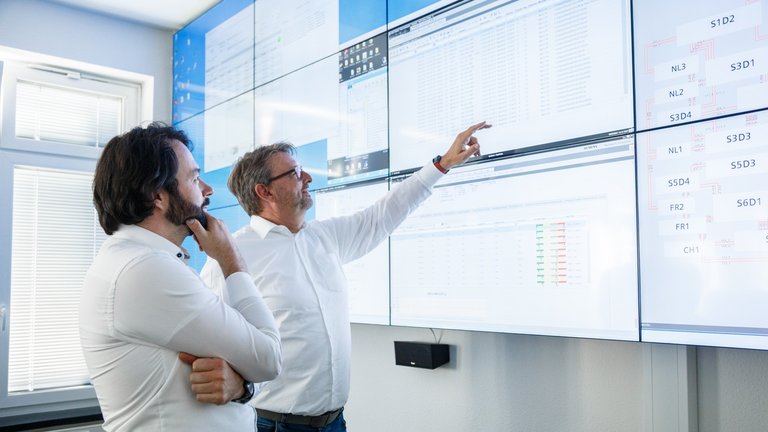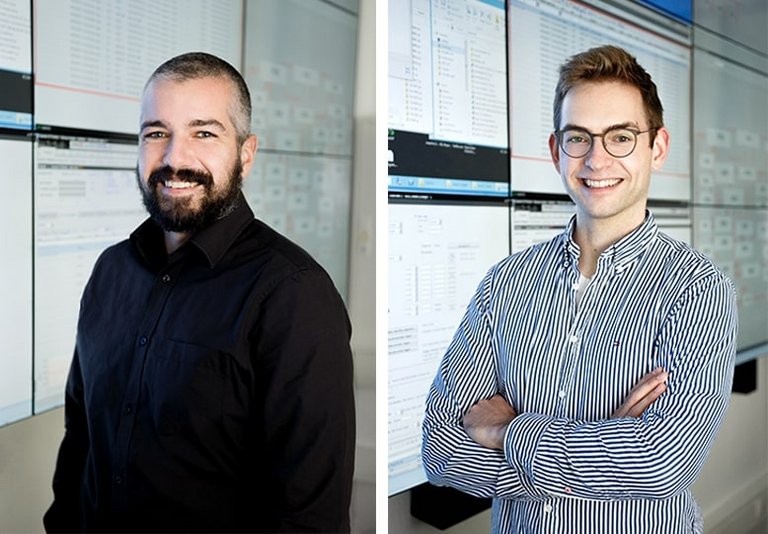Due to an increasing number of wind power and photovoltaic plants, energy grids are working at high capacity. In order to ensure a fail-safe power supply, scientists from the Electrical Power Supply Group want to make existing grids more resilient to the demands of the energy transition. In the large-scale Kopernikus project, they are helping to develop the energy grid of the future.

"Our energy network is becoming more and more dynamic and poses new challenges for research and industry," knows Dr. Steffen Schlegel, senior engineer at the Electrical Power Supply Group at the TU Ilmenau. Whereas before the energy transition, electricity was primarily generated from lignite, nuclear energy or natural gas and made available to end consumers via a few power plants, today energy must be fed in from numerous wind power or photovoltaic plants and simultaneously made available in larger quantities for applications such as heat pumps or electromobility: With the expansion of renewable energies, the energy grid is increasingly burdened.
In order to be able to continue to guarantee security of supply, scientists at the Electrical Power Supply Group are developing novel assistance systems for monitoring and evaluating the situation in the distribution grid as part of the Kopernikus project ENSURE II, which is part of a research initiative of the German government on the subject of the energy transition. The software solutions can use real-time calculations to identify possible overloads or inefficient modes of operation and provide grid operators with timely recommendations for action. Typical measures for improving the network condition include adjusting the network topology via switching measures, temporarily reducing consumption or the feed-in of renewable energies. For this purpose, tests are carried out in a modulated environment that simulates realistic grid operation. The researchers' goal is to make existing energy grids more efficient and secure, as Dr. Schlegel explains:
By using assistance systems, the security of supply and stability of energy grids are significantly increased. This means that more energy sources can be connected to the grid and higher loads can be handled without having to build more lines, which would not only be an intrusion into nature, but would also involve high costs and resource consumption.
Focus on distribution networks
Johannes Kayser, a research associate at the Electrical Power Supply Group, is playing a key role in the development of the assistance systems. He explains what the team is focusing on:
The electrical power system is a dynamic system. This means that it is always in transition between two states. While today individual states are considered and analyzed, we focus on this transition between the states. By continuously analyzing and evaluating this transition, i.e. the network dynamics, it is possible to make statements about network stability and supply security at any point in time. With this knowledge, reserves held in reserve, i.e. transmission capacities, can be used, which were otherwise established as security due to ignorance. This means in addition to information about the current robustness of the grid, the grid can be utilized more efficiently and thus more renewable energy can be integrated or more loads can be supplied without grid expansion.
In contrast to previous research projects in the field of energy supply, the scientists at TU Ilmenau are not focusing on transmission grids in the ENSURE II project, but on distribution grids that deliver power directly to the end user. In close cooperation with grid operators, industry and research institutions, the project's research results are being applied in a model region north of Hamburg. The district of Steinburg is considered an ideal environment for the research, as energy from wind turbines is fed into the grid here in large quantities. Scientists at TU Ilmenau will continue to research assistance systems until 2023 and examine their application with a view to urgency and added value for grid operation. Jan Kircheis, a research associate at the Electrical Power Supply Group, is working on the so-called islanding assessment within the ENSURE II project:
The assistance system currently under development is intended to evaluate and, if necessary, optimize the 'islanding capability' of network sections in the distribution network. In this context, islanding means that individual network sections can supply themselves temporarily without being connected to the rest of the network. If the assistance system detects deviations from the optimal conditions, it automatically calculates remedial measures that can be applied to improve islanding.
In the nationwide Kopernicus research project ENSURE of the German Federal Ministry of Education and Research, scientists, grid operators, industry and associations such as Deutsche Umwelthilfe want to design an overall concept for a renewable energy supply in Germany that is embedded in the existing socio-economic framework and ensures transferability of the results within Germany and Europe. The district of Steinburg in Schleswig-Holstein will be used as a model region to explore which technologies, operation management methods and control mechanisms will be needed in the future to transport more renewable electricity to consumers. After completion of the ENSURE I project, in which the foundations for the research project were laid, ENSURE II will concretize these approaches and technologies, which will be applied in the follow-up project ENSURE III.
Contact
Dr. Steffen Schlegel
Senior Engineer at the Electrical Power Supply Group


